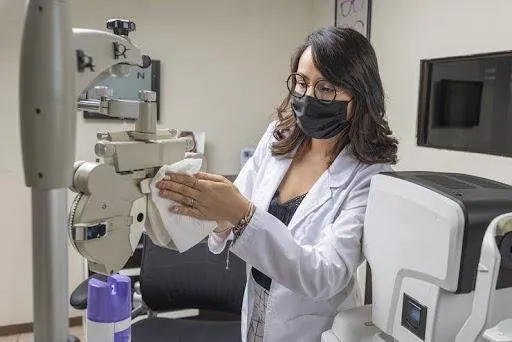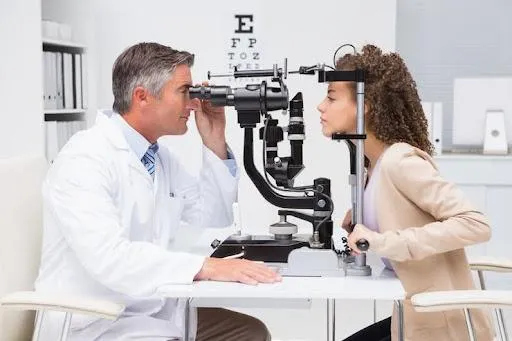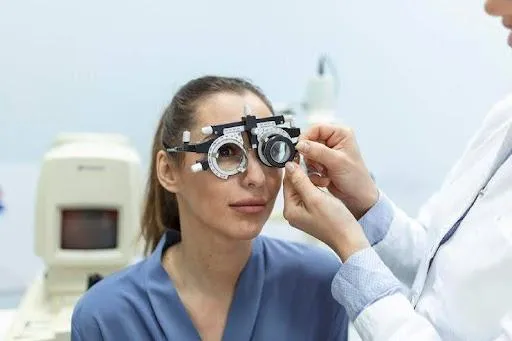Eye Care
Optometrist vs Ophthalmologist vs Optician
FSDAVCFEBFEVSDDVFSD
FSDAVCFEBFEVSDDVFSD
FSDAVCFEBFEVSDDVFSD
Understanding Eye Care Professionals
Your eyes are bothering you, but you’re not sure which eye care professional to call. It’s a common confusion because optometrists, ophthalmologists, and opticians each play different but important roles in eye health. Knowing their differences can help you get the right care when you need it most.
Optometrists provide primary eye care including eye exams, glasses, contacts, and treating many common eye conditions. Ophthalmologists are medical doctors who perform eye surgery and manage complex diseases. Opticians focus on fitting glasses and contact lenses based on prescriptions. This article breaks down each role to guide you on who to see for various eye needs.
Your eyes are bothering you, but you’re not sure which eye care professional to call. It’s a common confusion because optometrists, ophthalmologists, and opticians each play different but important roles in eye health. Knowing their differences can help you get the right care when you need it most.

Optometrists provide primary eye care including eye exams, glasses, contacts, and treating many common eye conditions. Ophthalmologists are medical doctors who perform eye surgery and manage complex diseases. Opticians focus on fitting glasses and contact lenses based on prescriptions. This article breaks down each role to guide you on who to see for various eye needs.

What Optometrists Do for Eye Care
Optometrists hold a Doctor of Optometry (OD) degree and are trained to provide comprehensive primary eye care. They perform routine eye exams, prescribe glasses and contact lenses, and diagnose and manage a wide range of eye conditions such as dry eye, glaucoma, and eye infections. At Kleinwood Vision, optometrists also offer advanced services like myopia management for children and NeuroLens therapy for patients experiencing digital eye strain or headaches, helping individuals of all ages maintain clear, comfortable vision.
As the first point of contact for most eye and vision concerns, optometrists play a central role in the overall eye care process. They are equipped to handle many medical eye issues and can refer patients to ophthalmologists when surgical intervention or specialized treatment is needed. This makes them an important part of a patient’s long-term vision care team.
In addition to diagnosing and treating eye conditions, optometrists focus heavily on preventative care. Regular visits can help detect early signs of disease and slow the progression of chronic conditions, ultimately preserving long-term vision. Their broad scope of expertise and accessibility make optometrists essential providers in maintaining eye health and preventing future complications.
Ophthalmologists and Their Eye Care Expertise

Ophthalmologists are medical doctors (MD or DO) who specialize in vision and eye health. They provide comprehensive medical and surgical eye care, including procedures such as LASIK, cataract removal, retinal repair, and glaucoma surgery. In addition to performing surgeries, ophthalmologists can prescribe medications, diagnose complex eye conditions, and manage diseases like macular degeneration and diabetic eye disease. They are trained to handle both routine and emergency eye health issues.
Most patients begin their eye care with an optometrist for regular exams or initial diagnosis.

If advanced treatment or surgery is needed, the optometrist refers the patient to an ophthalmologist. After surgical or medical intervention, follow-up care is often co-managed between the ophthalmologist and the optometrist. This team-based approach ensures a smooth, continuous treatment experience, giving patients access to specialized expertise while maintaining consistent, personalized care through their regular eye doctor.
Ophthalmologists often work closely with optometrists to manage a patient’s full eye care journey. For example, if you’re diagnosed with cataracts during an eye exam, your optometrist may refer you to a trusted ophthalmologist. After the cataract surgery is completed, your optometrist resumes care for recovery checkups and future vision needs. This coordinated care approach is efficient, especially for patients who prefer staying local for routine visits while receiving surgical care from a specialist.
Choosing an ophthalmologist typically depends on the complexity of your condition. For those considering LASIK or dealing with retinal detachment, macular issues, or glaucoma requiring surgery, an ophthalmologist provides the necessary care. However, they’re usually not your first stop. You’ll likely see one after being evaluated by an optometrist, who helps determine whether surgery or advanced care is needed. Understanding this path can make navigating eye care decisions far less overwhelming.
The Role of Opticians in Eyewear
Opticians specialize in creating and fitting eyewear, such as glasses and contact lenses, based on prescriptions from optometrists or ophthalmologists. They are not doctors and don’t diagnose or treat eye conditions. Instead, their focus is on ensuring you receive eyewear that not only matches your prescription but also fits comfortably and functions properly in your daily life.
They help patients select frames, explain lens options like coatings or transitions, and make adjustments to improve comfort. Opticians also repair broken frames and verify that the lenses are made to exact specifications. While they aren’t involved in eye exams or medical treatments, they are critical to the eyewear experience. Their support ensures your glasses or contacts perform as intended, which makes a noticeable difference in your day-to-day visual clarity and comfort.
How Opticians Assist You with Eyewear
Opticians play a crucial role in turning your eye doctor’s prescription into well-fitting, comfortable eyewear. They help you select frames that complement your lifestyle and facial features while ensuring lenses are accurately crafted for clear vision. Opticians also provide adjustments and repairs to improve the fit and comfort of your glasses or contact lenses.
While opticians work closely with optometrists and ophthalmologists, they do not diagnose or treat eye diseases. Their expertise is focused on helping patients achieve clear vision and comfort through properly made eyewear.
Opticians play a crucial role in turning your eye doctor’s prescription into well-fitting, comfortable eyewear. They help you select frames that complement your lifestyle and facial features while ensuring lenses are accurately crafted for clear vision. Opticians also provide adjustments and repairs to improve the fit and comfort of your glasses or contact lenses.
While opticians work closely with optometrists and ophthalmologists, they do not diagnose or treat eye diseases. Their expertise is focused on helping patients achieve clear vision and comfort through properly made eyewear.


With many options available in frames, lens materials, and coatings, patients often rely on opticians to guide them. Their personalized assistance makes a significant difference in daily vision, ensuring your eyewear meets your specific needs and preferences.
Choosing the Right Eye Care Provider
Knowing when to see each type of eye care professional is important for saving time and ensuring you receive the most appropriate treatment. For routine eye exams, vision correction updates, or mild symptoms such as dry eye or occasional eye strain, an optometrist is typically the best first point of contact. Optometrists provide comprehensive primary eye care, diagnosing common conditions and prescribing glasses or contact lenses to help maintain clear vision. They also monitor eye health and can detect early signs of disease.
If you are considering eye surgery, such as LASIK, or have more serious conditions like cataracts, retinal disease, or glaucoma, you should see an ophthalmologist. Ophthalmologists are medical doctors who specialize in advanced medical treatments and surgical procedures. They can perform surgeries to restore or improve vision and manage complex eye diseases that require specialized care. Patients often get referred to ophthalmologists by their optometrists when advanced treatment is necessary.
For new glasses, frame adjustments, or contact lens fittings, opticians are the experts who assist you after your eye exam. They focus on ensuring that your eyewear is comfortable, fits properly, and provides the best possible vision correction. Opticians also help you select frames that suit your lifestyle and facial features and provide repairs and maintenance for your glasses.
These three eye care professionals often work together as a team to deliver comprehensive care. Optometrists coordinate referrals to ophthalmologists when needed and follow up on treatments. This collaboration helps create a seamless experience for patients, ensuring their eye health is well managed at every stage.
Summary and Next Steps for Eye Care
Optometrists provide a wide range of primary eye care services, including eye exams, vision correction, and treatment for many common eye conditions. They are usually the first point of contact and work closely with ophthalmologists when advanced care or surgery is needed. Optometrists play a key role in detecting early signs of eye disease and maintaining overall eye health.
Ophthalmologists specialize in surgical procedures and managing complex eye diseases such as cataracts, glaucoma, and retinal disorders. They provide advanced medical treatment and perform surgeries that optometrists cannot. Opticians focus on fitting, adjusting, and dispensing eyewear like glasses and contact lenses, ensuring comfort and proper vision correction.

Optometrists provide a wide range of primary eye care services, including eye exams, vision correction, and treatment for many common eye conditions. They are usually the first point of contact and work closely with ophthalmologists when advanced care or surgery is needed. Optometrists play a key role in detecting early signs of eye disease and maintaining overall eye health.
Ophthalmologists specialize in surgical procedures and managing complex eye diseases such as cataracts, glaucoma, and retinal disorders. They provide advanced medical treatment and perform surgeries that optometrists cannot. Opticians focus on fitting, adjusting, and dispensing eyewear like glasses and contact lenses, ensuring comfort and proper vision correction.
If you’re frequently on the move or prefer not to wear glasses, multifocal contacts offer more freedom and convenience. They provide clear vision at multiple distances without the need for switching glasses, making them ideal for active lifestyles.
Together, optometrists, ophthalmologists, and opticians form a team that supports your complete eye care journey. Regular eye exams with an optometrist are essential, as they can guide you to the right specialist and ensure you receive the appropriate care for your vision needs.
When to Contact Kleinwood Vision
If you experience changes in vision, eye discomfort, or need a routine check-up, start by contacting Kleinwood Vision’s optometrists. They provide comprehensive eye exams and are skilled in managing many common eye conditions. Their thorough approach helps detect issues early and maintain your overall eye health. Whether it’s updating your prescription or addressing mild symptoms, their team offers personalized care tailored to your needs.
For more complex eye diseases or surgical needs, Kleinwood Vision’s optometrists coordinate care with trusted ophthalmologists to ensure seamless and effective treatment. They work closely with specialists to provide the best outcomes for patients requiring surgery or advanced medical interventions. After surgery, the optometrists offer convenient follow-up care nearby, making your recovery and ongoing management easier. Reaching out early for any eye concerns helps protect your vision and ensures you receive the right care at the right time, supporting long-term eye health and comfort.

Contact Info
Hours of Operation
Mon - Fri | 9:00 AM - 5:00 PM
Sat - Sun | Closed
Holiday Hours: We are closed for the following holidays: New Years Day, Memorial Day, Independence Day, Labor Day, Thanksgiving Day, Christmas Day
© 2026 Kleinwood Vision. All rights Reserved.


